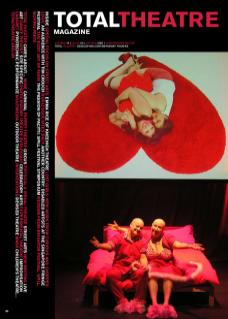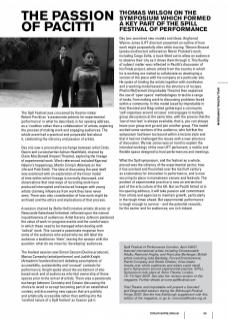The Spill Festival was conceived by theatre-maker Robert Pacitti as ‘a passionate polemic for experimental performance’ in what he described, in his opening address, as a ‘coalition rather than a collaboration’ of artists, exploring the process of making work and engaging audiences. The whole event had a practical and purposeful feel about it, celebrating the vibrancy and passion of artists.
Day one saw a provocative exchange between artist Cindy Oswin and curator/writer Adrian Heathfield, chaired by Claire MacDonald (Impact Theatre), exploring the lineage of experimental work. Work referenced included Kaprow/ Halprin’s happenings, Martin Crimp’s Attempts on Her Life and Patti Smith. The idea of discussing the past itself was examined with an exploration of the linear model of time within which lineage is normally discussed, and observations that new ways of recording work have produced interrupted and fractured lineages with young artists claiming influences from work they have never seen. There was also consideration of how work might be archived and the ethics and implications of that process.
A session chaired by Stella Hall (creative artistic director at Newcastle Gateshead Initiative) reflected upon the natural inquisitiveness of audiences. Artist Karena Johnson pondered the value of work-in-progress events and the careful ways in which these need to be managed when dealing with ‘radical’ work. This caused a passionate response from some of the audience who asked why we still label the audience a totalitarian ‘them’, leaving the session with the question: what do we mean by ‘developing’ audiences. The liveliest session saw Simon Casson (Duckie producer), Marisa Carnesky (artist/performer) and Judith Knight (Artsadmin founder/director) debating assumptions of accessibility, sustainability and ‘unusual’ contexts for performance. Knight spoke about the excitement of sitebased work and of audiences who feel ownership of these spaces prior to the arrival of artists. There was a passionate exchange between Carnesky and Casson discussing the choice to avoid or accept becoming part of an established context, and discovering new spaces that are publicly and artistically accessible rather than settling into the ‘rarefied nature of a Spill festival’ as Casson put it.
Day two examined new models and ideas. Angharad Wynne-Jones (LIFT director) presented an outline of how work might purposefully alter while touring. Tilmann Broszat (producer/director) reflected on Rimini Protokol’s work, including Cargo Sofia, a truck fitted out to allow an audience to observe their city as it drives them through it. This fluidity of subject matter was reflected in Pacitti’s discussion of his Finale project, where artists from the country in which he is working are invited to collaborate on developing a version of the piece with his company at a particular site. He spoke of binding the artists together with manifestos and a working model based on the structure of recipes. Phelim McDermott (Improbable Theatre) then explained the use of ‘open space’ methodologies to tackle a range of tasks, from making work to discussing problems faced within a community. In this model (used by Improbable in their Devoted and Disgruntled gatherings) a community ‘self-organises around an issue’ and engages in multiple group discussions at the same time, with the proviso that the ‘law of two feet’ is always available, that is, you can always leave your group and go and join another group. This model excited some sections of the audience, who felt that the symposium had been too bound within a lecture style and that it had not challenged the issues with a new structure of discussion. Wynne-Jones was on hand to explain the intended workings of the new LIFT parliament, a mobile and flexible space designed to host performances and meetings.
What the Spill symposium, and the festival as a whole, proved was the vibrancy of the experimental sector; how it has survived and flourished over the last half century as a laboratory for innovation in performance, and is now securing its place in mainstream venues and festivals. The position of experimental practice is now an entrenched part of the arts culture of the UK. But as Pacitti hinted at in his opening address, it will take passion and commitment from artists and agencies to maintain growth, particularly in the tough times ahead. But experimental performance is tough enough to survive – and the potential rewards, for the sector and for audiences, are rich indeed.
Spill Festival of Performance (London, April 2007) featured international artists including Unreasonable Adults, Raimond Hoghe, and Francoise Berlanger; British artists including Julia Bardsley, Forced Entertainment, Pacitti Company and Sheila Ghelani, three feasts (meals over which audiences and artists could meet) and a Symposium around experimental practice. SPILL Symposium took place at Soho Theatre, London, 12–13 April 2007. See also the reviews section of this magazine. Further details at www.spillfestival.com
Total Theatre and Improbable will present a Devoted and Disgruntled session during the Edinburgh Festival Fringe 2007. See the free Edinburgh supplement with this edition of the magazine, or go to: www.totaltheatre.org.uk

